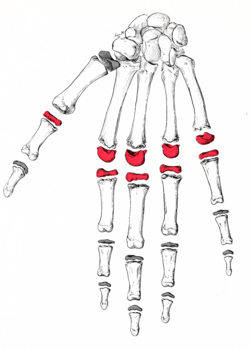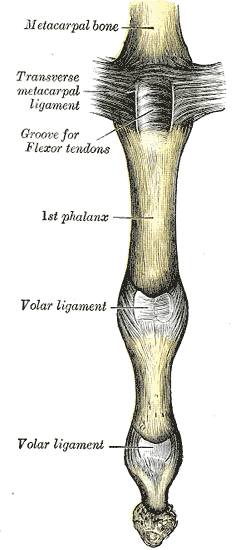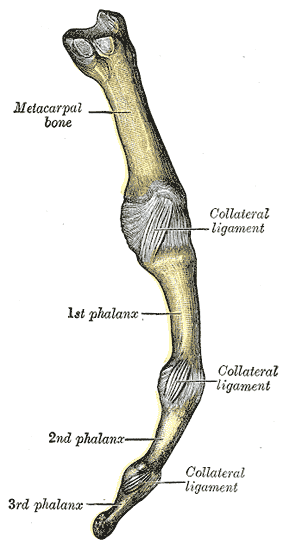Metacarpophalangeal joint facts for kids
Quick facts for kids Metacarpophalangeal joint |
|
|---|---|
 |
|
| The palme side of the hand showing the bones and joints spread out. MCP joints in red. | |
 |
|
| System | 099 |
The metacarpophalangeal joints (say "met-uh-CAR-po-fuh-LAN-jee-ul"), often called MCP joints, are important connections in your hand. They are found where the long bones in your palm (called metacarpals) meet the first bones of your fingers (called proximal phalanges).
Think of them as the knuckles where your fingers join your hand. The ends of the palm bones are rounded, and the ends of the finger bones have a hollow, cave-like shape. This design helps them fit together perfectly, like pieces of a puzzle, allowing your fingers to bend and move.
Contents
Understanding Your MCP Joints
Your hand has five MCP joints, one for each finger and thumb. These joints are super important for many everyday activities, like gripping things, writing, or playing sports.
Strong Connections: Ligaments
Ligaments are strong, stretchy bands of tissue that connect bones to other bones. At your MCP joints, ligaments help hold the metacarpal and phalanx bones together. They make sure your joints are stable and don't move too much in the wrong direction, protecting them from injury.
One important ligament is called the palmar plate. It's a thick band of tissue on the palm side of the joint. It helps stop your fingers from bending backward too far.
How Your MCP Joints Move
MCP joints are a type of joint called a condyloid joint. This means they allow your fingers to move in several ways:
- Bending and Straightening: You can bend your fingers towards your palm (flexion) and straighten them out (extension).
- Spreading and Bringing Together: You can spread your fingers apart (abduction) and bring them back together (adduction).
These movements work together to give your hands amazing flexibility and strength!
See also
 In Spanish: Articulación metacarpofalángica para niños
In Spanish: Articulación metacarpofalángica para niños
 | Precious Adams |
 | Lauren Anderson |
 | Janet Collins |


